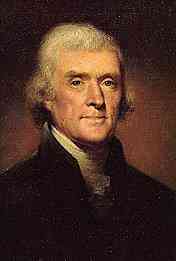
To Samuel H. Smith Monticello, September 21, 1814DEAR SIR,-- I learn from the newspapers that the Vandalism of our enemy has triumphed at Washington over science as well as the arts, by the destruction of the public library with the noble edifice in which it was deposited. Of this transaction, as of that of Copenhagen, the world will entertain but one sentiment. They will see a nation suddenly withdrawn from a great war, full armed and full handed, taking advantage of another whom they had recently forced into it, unarmed, and unprepared, to indulge themselves in acts of barbarism which do not belong to a civilized age. When Van Ghent destroyed their shipping at Chatham, and De Ruyter rode triumphantly up the Thames, he might in like manner, by the acknowledgment of their own historians, have forced all their ships up to London bridge, and there have burnt them, the tower, and city, had these examples been then set. London, when thus menaced, was near a thousand years old, Washington is but in its teens. I presume it will be among the early objects of Congress to re-commence their collection. This will be difficult while the war continues, and intercourse with Europe is attended with so much risk. You know my collection, its condition and extent. I have been fifty years making it, and have spared no pains, opportunity or expense, to make it what it is. While residing in Paris, I devoted every afternoon I was disengaged, for a summer or two, in examining all the principal book-stores, turning over every book with my own hand, and putting by everything which related to America, and indeed whatever was rare and valuable in every science. Besides this, I had standing orders during the whole time I was in Europe, on its principal book-marts, particularly Amsterdam, Frankfort, Madrid and London, for such works relating to America as could not be found in Paris. So that in that department particularly, such a collection was made as probably can never again be effected, because it is hardly probable that the same opportunities, the same time, industry, perseverance and expense, with some knowledge of the bibliography of the subject, would again happen to be in concurrence. During the same period, and after my return to America, I was led to procure, also, whatever related to the duties of those in the high concerns of the nation. So that the collection, which I suppose is of between nine and ten thousand volumes, while it includes what is chiefly valuable in science and literature generally, extends more particularly to whatever belongs to the American statesman. In the diplomatic and parliamentary branches, it is particularly full. It is long since I have been sensible it ought not to continue private property, and had provided that at my death, Congress should have the refusal of it at their own price. But the loss they have now incurred, makes the present the proper moment for their accommodation, without regard to the small remnant of time and the barren use of my enjoying it. I ask of your friendship, therefore, to make for me the tender of it to the library committee of Congress, not knowing myself of whom the committee consists. I enclose you the catalogue, which will enable them to judge of its contents. Nearly the whole are well bound, abundance of them elegantly, and of the choicest editions existing. They may be valued by persons named by themselves, and the payment made convenient to the public. It may be, for instance, in such annual instalments as the law of Congress has left at their disposal, or in stock of any of their late loans, or of any loan they may institute at this session, so as to spare the present calls of our country, and await its days of peace and prosperity. They may enter, nevertheless, into immediate use of it, as eighteen or twenty wagons would place it in Washington in a single trip of a fortnight. I should be willing indeed, to retain a few of the books, to amuse the time I have yet to pass, which might be valued with the rest, but not included in the sum of valuation until they should be restored at my death, which I would carefully provide for, so that the whole library as it stands in the catalogue at this moment should be theirs without any garbling. Those I should like to retain would be chiefly classical and mathematical. Some few in other branches, and particularly one of the five encyclopedias in the catalogue. But this, if not acceptable, would not be urged. I must add, that I have not revised the library since I came home to live, so that it is probable some of the books may be missing, except in the chapters of Law and Divinity, which have been revised and stand exactly as in the catalogue. The return of the catalogue will of course be needed, whether the tender be accepted or not. I do not know that it contains any branch of science which Congress would wish to exclude from their collection; there is, in fact, no subject to which a member of Congress may not have occasion to refer. But such a wish would not correspond with my views of preventing its dismemberment. My desire is either to place it in their hands entire, or to preserve it so here. I am engaged in making an alphabetical index of the author's names, to be annexed to the catalogue, which I will forward to you as soon as completed. Any agreement you shall be so good as to take the trouble of entering into with the committee, I hereby confirm. Accept the assurance of my great esteem and respect. |
